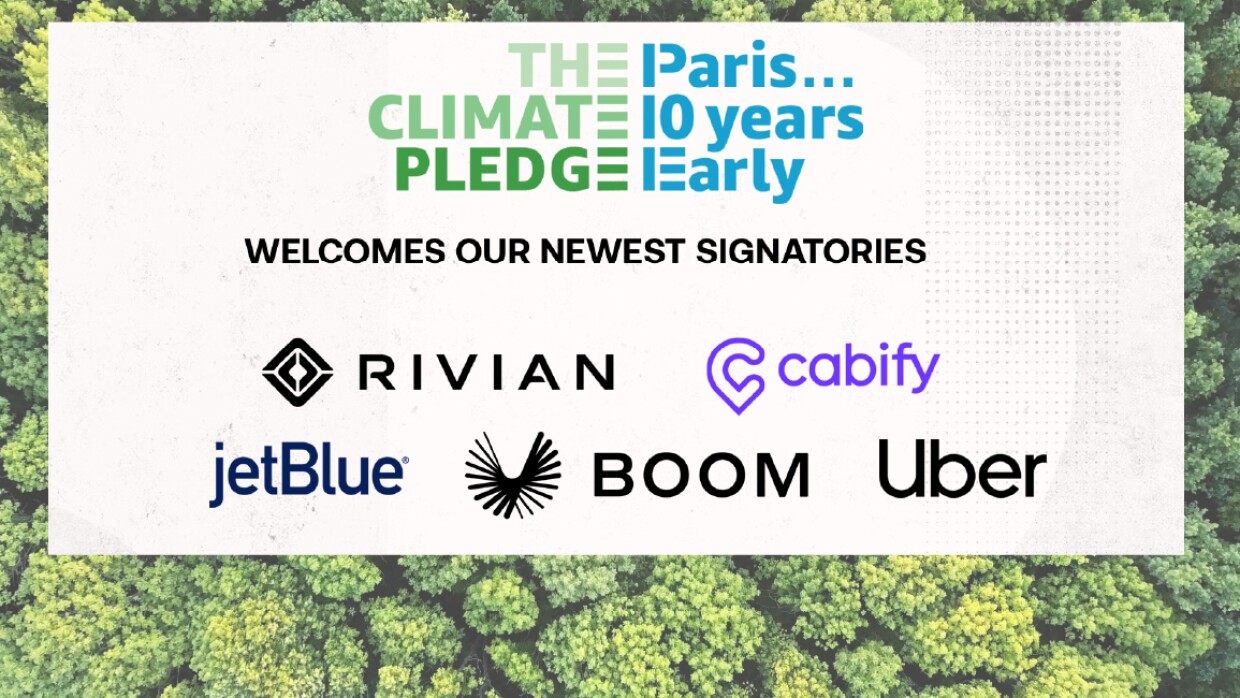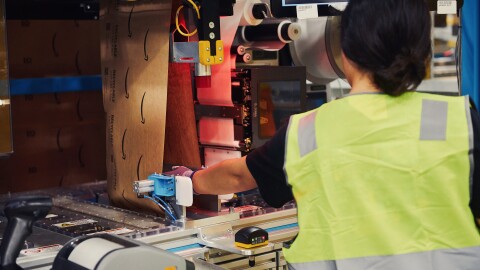Creating more sustainable transportation methods is one of the most important, challenging, yet achievable way to tackle climate change. From electric vehicles (EV) to sustainable aviation fuel (SAF), we’ve just scratched the surface of how we can use new technologies to reduce carbon emissions. The addition of Boom, Cabify, JetBlue, Rivian, and Uber to The Climate Pledge—a commitment to meet the needs of the Paris Agreement by 2040—will bolster these efforts.
“By signing The Climate Pledge, companies around the world are making a bold commitment to help protect our planet from the devastating impacts of climate change,” said Jeff Bezos, Amazon founder and CEO. “The transportation sector plays a critical role in accelerating our carbon reduction goals, and we welcome Boom, Cabify, JetBlue, Rivian, and Uber as they join us on the journey to net-zero carbon by 2040. The 18 companies who have signed The Climate Pledge so far are demonstrating leadership in the vital transition to a low-carbon economy that will help preserve the environment for future generations.”
Boom is redefining commercial flight by bringing supersonic travel back to the skies. Boom’s historic airliner, Overture, is designed to industry-leading standards for speed, safety, and sustainability. In February 2020, the company announced that the test program for its XB-1 demonstrator will be carbon neutral through the use of SAF and high-quality, vetted carbon offsetting. Boom has committed to net-zero carbon development, testing, and operation, and is a member of several organizations working to accelerate the adoption and supply of SAF for the airline industry. In achieving its vision to make the world more accessible, Boom views speed and sustainability as compatible goals.
Cabify is the first and only urban mobility app in Europe and Latin America to be carbon neutral by offsetting 100% of all the carbon emissions that it generates – from its corporate operations and for every ride booked through the app.. Cabify closely measures and reduces emissions for its corporate activity and aims to electrify its transportation fleet in Spain and Latin America by 2025 and 2030, respectively. The company is focused on increasing environmental protections and promoting renewable energies by working on large-scale efforts in Chile, Peru, and Brazil using solutions like block chain technology for carbon offsetting.
JetBlue is the first airline to join The Climate Pledge; reaffirming the company’s commitment to take measurable steps toward reducing its climate impact. In July 2020, JetBlue became the first and only U.S. airline to achieve carbon neutrality for all domestic flights. The airline expects to ramp up to over 7 million metric tons of CO2 emissions offset each year—the annual equivalent of removing more than 1.5 million passenger vehicles from the road. JetBlue views carbon offsetting as a bridge to ramp up lower-carbon technologies, such as SAF, and build more fuel-efficient aircraft and operations. JetBlue began using a type of SAF in July 2020 for flights out of San Francisco International Airport, enabling up to an 80 percent reduction in CO2 emissions before being blended with traditional jet fuel.
Rivian is launching a range of adventure-oriented vehicles, alongside delivery vans designed specifically for Amazon last-mile delivery applications. The company’s consumer vehicles, the R1T and R1S, deliver a unique combination of performance, off-road capability, and utility. These vehicles use the company’s flexible “skateboard” platform and will be produced at Rivian’s manufacturing plant in Normal, Ill., with customer deliveries beginning in June 2021.
Uber has committed to become a zero-emission platform by 2040, with 100% of rides taking place in zero-emission vehicles, on public transit, or with micro mobility options such as bikes and scooters. Uber previously set a goal to provide 100% of rides in electric vehicles (EVs) by 2030 in U.S., Canadian, and European cities. Uber has also committed to reach net-zero emissions from its corporate operations by 2030. To reach these goals, Uber is investing in programs and resources to expand Uber Green—an option that allows riders to choose to travel in hybrids or EVs—and will dedicate $800 million in resources to help hundreds of thousands of drivers transition to EVs by 2025. Additionally, the company will invest in a multimodal network to provide sustainable alternatives to personal cars, and has committed to being transparent and accountable to the public .
By joining The Climate Pledge, signatories are not just making a statement of commitment to the future, they also are setting a pathway to significant actions and investments that will create jobs, spur innovation, regenerate the natural environment, and help consumers to buy more sustainable products.
“The Paris Agreement set out a unifying roadmap for all countries and people to address the climate crisis by taking action,” said Christiana Figueres, the UN’s former Climate Change Chief and Global Optimism’s founding partner. “By joining The Climate Pledge, signatories are not just making a statement of commitment to the future, they also are setting a pathway to significant actions and investments that will create jobs, spur innovation, regenerate the natural environment, and help consumers to buy more sustainable products.”
In 2019, Amazon and Global Optimism co-founded The Climate Pledge, a commitment to reach the Paris Agreement 10 years early and be net-zero carbon by 2040. Eighteen organizations have now signed The Climate Pledge: Amazon, Best Buy, Boom, Cabify, Henkel, Infosys, JetBlue, McKinstry, Mercedes-Benz, Oak View Group, Real Betis, Reckitt Benckiser (RB), Rivian, Schneider Electric, Siemens, Signify, Uber, and Verizon.
These companies are sending an important signal that there will be rapid growth in development of products and services that help reduce carbon emissions. For more information visit: www.theclimatepledge.com.
This content is hosted by a third party (www.youtube.com).
To view the content, you need to consent to cookies by selecting Accept all in the popup banner. Or you can go to the site footer, select Cookie Preferences, and then select On under Functional Cookies, Performance Cookies and Advertising Cookies.












